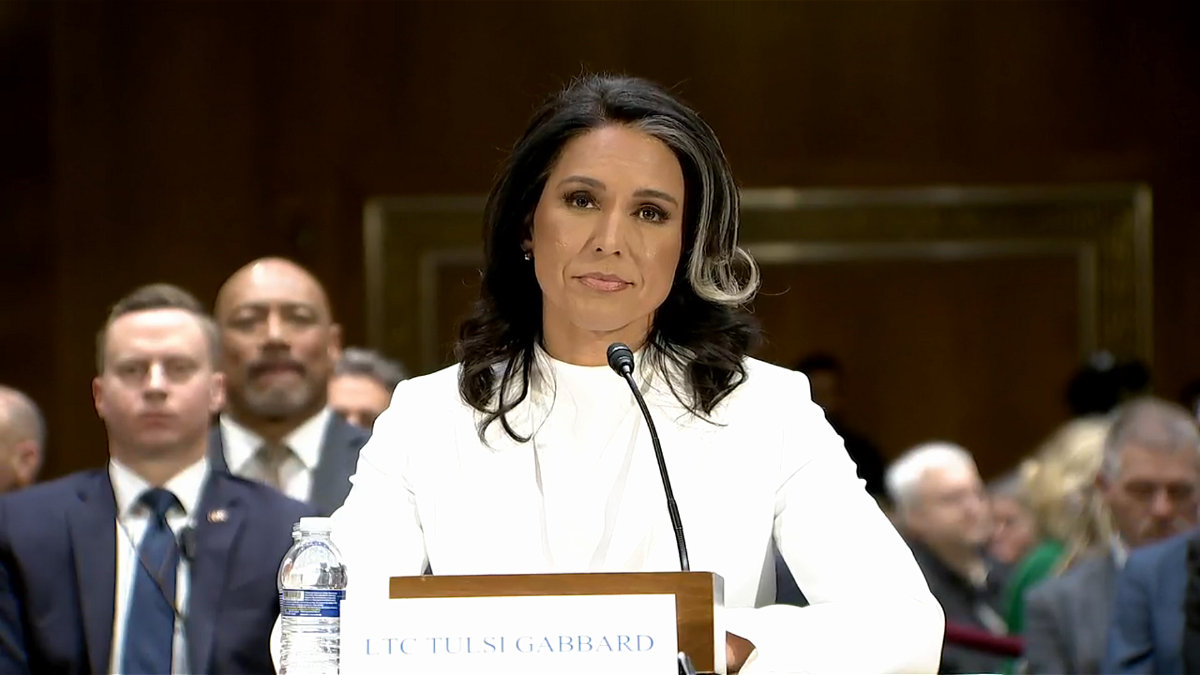Tech Policy Takeaways from US Senate Confirmation Hearings - Lutnick, Gabbard, Patel, and Kennedy
David Paiz-Torres / Feb 4, 2025
Washington, DC - January 30, 2025: Tulsi Gabbard answers questions during a Senate confirmation hearing following her nomination to be Director of National Intelligence. Source
During last week’s US Senate confirmation hearings, key officials nominated by President Donald Trump answered questions from members of the Senate. Nominees included Howard Lutnick for Secretary of Commerce, Tulsi Gabbard for Director of National Intelligence, Kash Patel for Director of the Federal Bureau of Investigation, and Robert F. Kennedy Jr. for Secretary of Health and Human Services. Though the hearings were not focused on tech, some of the nominees' answers provided a glimpse into the administration’s possible approach to key tech policy issues.
Lutnick Calls for Tariffs and Export Controls and Hints at Reviewing Approved Tech Grants
Artificial intelligence and the Broadband Equity Access and Deployment Program (BEAD) came up frequently throughout Howard Lutnick’s confirmation hearing for Secretary of Commerce, with Lutnick facing repeated questions about what he would do to combat China’s recent advancements in the AI sector if confirmed. Lutnick accused China of intellectual property theft in the development of DeepSeek and hinted at tariffs to complement export controls. “Export controls, not backed by tariffs, are like a whack-a-mole model,” he said, later adding, “we’ve got to find a way to back our export controls with tariff models.”
During the hearing, Sen. Ed Markey (D-MA) further grilled Lutnick on whether he would commit to honoring CHIPs Act grant contracts that have already been finalized. Lutnick was reluctant to do so, stating, “I would have to read them and analyze them and understand them to commit to that.”
Lutnick also would not commit to disbursing Nevada’s recently approved $416 million BEAD grant, stating, “I can commit I will read through the document, understand it with precision, and make sure that the outcome that you appropriated for, which is broadband to your citizens, I'm totally committed to that, but I want to make sure it's done efficiently, and effectively,” when asked by Sen. Jacky Rosen (D-NV). Lutnick also called for the use of satellite and wireless technologies alongside fiber-optic networks in the BEAD program, which it currently prioritizes.
Sen. John Hickenlooper (D-CO) questioned Lutnick on how he would secure US supply chains for critical minerals used in the production of semiconductors. Lutnick responded, “we need to bring domestic mining back,” later adding, “we had a great lithium find in Arkansas.” Lutnick was referring to the United States Geological Survey’s October discovery of lithium in the state. The rare earth metal is used in the production of EV batteries and semiconductors.
Gabbard Claims Support for Encryption and Endorses Domestic Semiconductor Production
Tulsi Gabbard was pressed over her support of Edward Snowden, her views on TikTok and encryption, and whether she would recommend investments in domestic semiconductor production. When asked if she would advise that the president “continue to invest in the semiconductor industry” on national security grounds, she said “yes.” Senators also questioned Gabbard on encryption – questioning her previous opposition to private companies allowing back-door entry points for governments to bypass encryption in American cell phones. Gabbard reiterated her opposition to backdoors, stating that they “lead down a dangerous path that can undermine American’s fourth Amendment rights and civil liberties.”
When asked about her views on China by Sen. Kirsten Gillibrand (D-NY), Gabbard said the US-China relationship was “complex” and that “there are a number of challenges and threats that need to be navigated,” citing the recent cyber intrusions on major US telecommunications companies that have been attributed to state-sponsored Chinese hackers.
Gabbard was also questioned about her previous opposition to the law that nearly banned TikTok and attempts to repeal section 702 of FISA. Sen. Mark Warner (D-VA) acknowledged that many in the Senate have attempted to reform FISA to “better balance security and civil liberties” before blasting Gabbard. “Not only did you vote against Reauthorizing 702, you actually introduced legislation to fully repeal the whole thing,” he said. Section 702 has been the subject of controversy for years but has received renewed attention after a court found that FBI agents improperly accessed the information of American citizens. Last year, Congress voted to reauthorize Section 702 for another two years, but efforts to amend the law and require a warrant before accessing the communications of American citizens failed.
Patel Questioned on Foreign Intelligence Surveillance Act, Social Media Censorship
Sen. Dick Durbin (D-IL) questioned FBI Director nominee Kash Patel on whether requiring a warrant to access data and communications on US citizens is practical under Section 702 of the Foreign Intelligence Surveillance Act. Patel responded that it was not, stating, “a warrant requirement to go through that information in real-time is just not comported with the requirement to protect American citizenry.”
Section 702 came up frequently, with Sen. Mike Lee (R-UT) naming instances where American citizens' communications were improperly intercepted by agents misusing their access to FISA databases. In one case, Sen. Lee said, “an agent looked at people who were thinking about renting an apartment from him to make sure they were upstanding citizens and could be trusted.”
Social media issues also came up during the hearing. Patel was also questioned by Sen. Josh Hawley (R-MO) on social media “censorship,” to which Patel vowed to “expose any corrupt activities the FBI has participated in, especially in the censorship of free speech.” The idea that major platforms colluded with the federal government to limit the speech of conservatives has become a rallying cry amongst MAGA Republicans in recent years.
RFK Jr. and AI in the Health Sector
During his confirmation hearing, Robert F. Kennedy Jr., nominated to be Secretary for Health and Human Services, highlighted the administration’s interest in the use of telemedicine and artificial intelligence in the medical sector, telling Sen. John Kennedy (R-LA) that President Trump had asked him to “end the hemorrhage of rural hospitals” through the use of AI. RFK Jr. also claimed, “The Cleveland Clinic has developed an AI nurse that you cannot distinguish from a human being that has diagnostics as good as any doctor.” (The Cleveland Clinic issued a statement clarifying it had not, in fact, developed an AI nurse.) According to reporting from Politico, the implementation of AI-powered healthcare solutions to reduce federal spending on healthcare aligns with policy supported by Trump-aligned think tanks. The largest union of nurses, National Nurses United, opposes RFK Jr.’s nomination.
Authors
